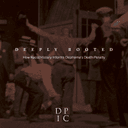
In the December 2019 edition of the Discussions with DPIC podcast, Death Penalty Information Center Executive Director Robert Dunham and Managing Director Anne Holsinger discuss DPIC’s 2019 Year End Report. The podcast explores the major themes presented in the year’s death-penalty news and developments, including innocence, declining use of capital punishment, and systemic problems revealed by the new death sentences and executions in 2019.
The two major themes of the 2019 report, Dunham said, were “that the death penalty appears to be disappearing in some parts of the country and eroding in others” and “the continued unreliability of the death penalty” in the cases in which it was imposed or carried out. He tells the stories of some of the year’s notable cases, including Rodney Reed and Domineque Ray. The conversation also covers some of the long-term trends in capital punishment, especially the sustained decline in new death sentences and executions.
Dunham spends much of the podcast telling compelling and emotional stories from the year, drawing out the ways in which those stories illustrate broader themes about the death-penalty system. He and Holsinger take a look at the clemency process in 2019, noting some of the cases in which petitions’ requests for clemency were denied or not pursued, as well as the two grants of clemency in Kentucky at the end of the year. One of those case involved such abysmal representation that Governor Matt Bevin observed, “to say [Gregory Wilson’s] legal defense was inadequate would be the understatement of the year.” The other, the case of Leif Halvorsen, provided a powerful example of remorse and redemption.
Innocence cases in 2019 raised issues of junk science, racial bias, official misconduct, and deficient appellate review, Dunham said. The year’s executions, he said, reflected that “the death penalty was carried out on the most vulnerable, rather than the most culpable,” as 19 of the 22 executions involved prisoners who exhibited evidence of serious mental illness, brain damage, or an IQ in the intellectually disabled range, or who had experienced severe, chronic trauma.
The latter half of the episode moves to a discussion of death penalty trends and their underlying causes. Dunham describes changes in public opinion on capital punishment, regional divides, and the political shifts that have led even conservative states to reconsider the death penalty. He says that a “culture change” is underway as the public grows more aware of innocence cases, murder rates remain low, and younger Americans become more skeptical of capital punishment. The public’s changed view of capital punishment, Dunham said, helps to explain why the attempts by the federal government to resume executions did not appear to influence new death sentences and executions at the state and county levels. Dunham concludes, “we may be reaching a point in which it is considered an outlier practice, just having the death penalty at all.”
Discussions with DPIC: The DPIC 2019 Year End Report, December 26, 2019.



